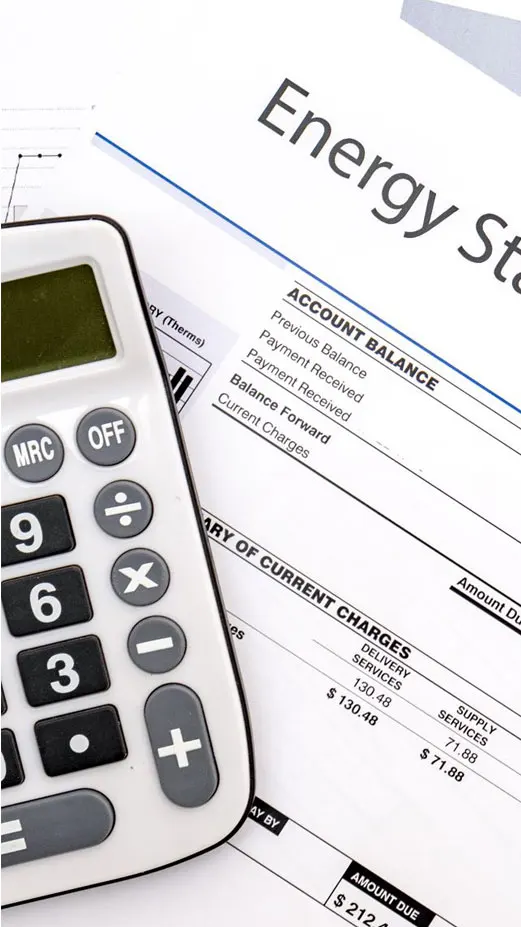Are you aware of the environmental impact of your energy efficiency?
Regardless of whether you notice or not, the energy that you consume has some sort of impact on the environment. Of the total energy consumed in the United States, about 40% is used to generate electricity, making electricity use an important part of each person’s environmental footprint. Using electricity more efficiently reduces both the amount of fuel needed to generate electricity and the amount of greenhouse gases and other emissions emitted in the process. Understanding how the amount and type of energy we consume affects the planet, can promote interest and demand for energy efficiency and higher renewable content in the electricity plans selected which can effectively avoid or minimize these impacts as we continue to use energy.
Renewable Energy: Wind and Solar
Renewable power is power generated from naturally-replenishing resources that aren’t depleted when used, such as wind or solar power. The increase in adoption of Renewable energy can help the environment by reducing the carbon emissions associated of fossil fuels and cut down on global warming emissions. Clean energy can also reduce air and water pollution otherwise generated by coal and natural gas plants and does not have to consider water scarcity.
Although the cost of installing and maintaining renewables has long been a concern for mass adoption, the costs of renewable energy equipment have lately been on a downward trend, making renewable energy much more affordable. In fact, renewable facilities can operate at very low costs, with wind and utility-scale solar being the least expensive energy generating sources.
On top of all that, renewable energy can provide a stand-alone power system for electricity that is reliable and cheap. This means that renewable sources are accessible and able to supply even remote and off-the-grid communities with electricity.

Non-Renewable Energy: Fossil Fuels
Fossil fuels, including coal, oil, and natural gas, are non-renewable resources that are formed from organic material over the course of millions of years. They are currently the world’s primary energy source and supply about 79% of the energy consumed in the US.
Fossil fuels are important to satisfy growing energy demands and keep the world moving. They are used massively for transportation, industry, and power generation. However, there are problematic effects of using them. The burning of fossil fuels is considered the largest contributing factor to the release of greenhouse gases. Since the combustion of these fuels emits compounds such as carbon dioxide and methane, fossil fuels have been the biggest cause behind increased global warming.
It is important to keep in mind that not all fossil fuels are equally damaging, cheap natural gas, has half the CO2 emissions of coal and while it has its own challenges, it is considered a cleaner fuel in the transition towards our low-carbon future. In fact, between 2007 and 2017 the USA reduced carbon emissions by 14% replacing coal with cleaner gas from Texas. For our state, Texas grid operator ERCOT reported that in 2018 the electricity generated in the state came 40% from gas and 19% from wind. Coal represented 25% down from 40% in 2010.
How Electricity Use Affects the Environment
It isn’t as easy to see, but energy efficiency has a direct impact on the environment.
Most of the country’s energy is generated in power plants, which burn fossil fuels (like natural gas and coal) to heat water and produce steam. The steam then spins turbines to produce electricity, which is then distributed to communities. As these plants burn fossil fuels, they emit large amounts of greenhouse gases.
The higher the electricity demand, the more fossil fuels a plant consumes, and the more greenhouse gases they produce.
Our collective goal is to reduce electricity demand so that power plants don’t have to consume as much fossil fuels, and consequently, they won’t emit as much greenhouse gases.
Why Energy Efficiency is Important to the Environment
Reducing the collective demand for electricity starts at home — your home.
If your home is energy-efficient, you use less energy to produce the same result. No energy is wasted, and your home needs less electricity.
If every home becomes energy-efficient, there’s a huge reduction in the amount of electricity needed to power Texas. In turn, this means power plants burn fewer fossil fuels and produce fewer greenhouse gases.


Your Energy Efficiency Matters. Optimize Your Energy Use Today!
Use an Energy Savings Calculator
Find the Lowest Energy Plan
How You Can Help Reduce the Environmental Impact
It’s important to note that not all power-generating plants use fossil fuels; some rely on biofuels and nuclear power. But it’s safe to say that a massive chunk of the electricity you consume is generated in a plant that relies on fossil fuel.
So, here are a few ways you can do your part in lessening the environmental impact of energy and lowering electricity demand from power plants.
- Eliminate Energy Wastage – Uncover and address the energy leaks in your home.
- Switch to Energy-Efficient Appliances – Use appliances that consume less energy.
- Shift to Renewable Energy – If possible, find ways to harness solar or wind power for your daily consumption.
EnerWisely Supports Your Climate Action Goals
EnerWisely has always been an advocate of energy efficiency to reduce the negative environmental impact. We have developed solutions that help Texan homes optimize energy use. Our Home Energy Audit uncovers energy leaks in your home so you can address them, while our Energy MatchMaker enables you to find the energy plan that balances getting the lowest cost, and reducing carbon emissions.
Our team also works to promote energy education and awareness. Our partnership with Energy Star is about promoting Energy Efficiency and offering 100% on-line free energy audits to Texans. EnerWisely’s goal is to empower everyone with free, easy to use tools to save money and reduce carbon emissions. To coordinate a community event, please contact our team.


